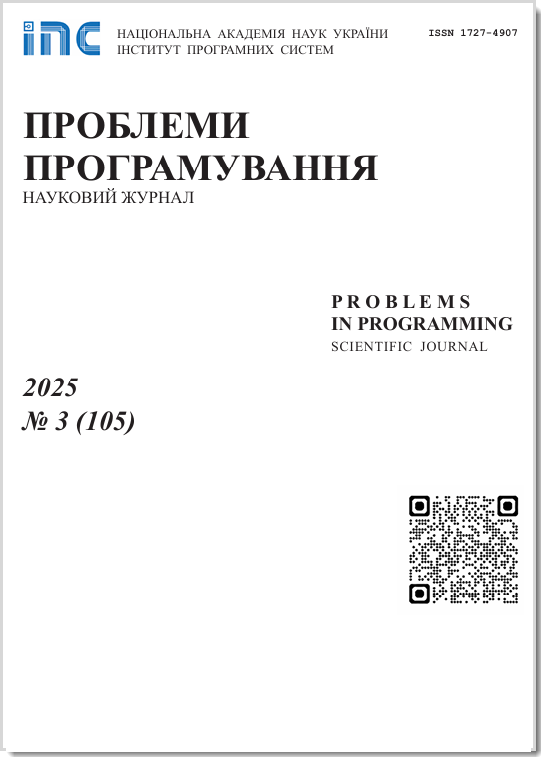Comparison of the effectiveness of the Map-Reduce approach and the actor model in solving problems with high connectivity of inp data on the example of the optimization problem for a swarm of particles
Abstract
The paper defines the notion of distributed problems with bounded input components. Particle Swarm Optimization problem is shown to be an example of such a class. Such a problem's implementation based on the Map-Reduce model (implemented on the Spark framework) and an implementation based on an actor model with shared memory support (implemented on Strumok DSL) is provided. Both versions' performance assessment is conducted. The hybrid actor model is shown to be an order of magnitude more effective in time and memory efficiency than Map-Reduce implementation. Additional optimization for the hybrid actor model solution is proposed. The prospects of using the hybrid actor model for other similar problems are given.
Problems in programming 2021; 1: 49-55
Keywords
Full Text:
PDF (Українська)References
Boris T.V., Alekseev M.O., Comparative analysis of MapReduce - technology for parallel computation of large data sets. Proceedings of the Second International Conference "Cluster Computing". Lviv, 2013. P. 54–57.
Gladkiy M.V., Model of distributed calculations MapReduse. Proceedings of BSTU. 2016. N 6. P. 194–198.
MapReduce – a quick guide: a website. URL: https://coderlessons.com/tutorials/bolshie-dannye-i-analitika/izuchit-kartu-umenshit/mapreduce-kratkoe-rukovodstvo (accessed 15 07 2020).
Matthew Zechariah, An Architecture for Fast and General Data Processing on Large Clusters. Association for Computing Machinery and Morgan & Claypool. 2016. P. 89.
Hlybovets M.M., Zinchuk S.O., Using the model of actors for the implementation of distributed computing. System research and information technology. 2015. N 2. P. 16–25.
Akka: website. URL: https://akka.io/ (accessed 19 July 2020).
Larin V.O., Bantysh O.V., Galkin O.V., Provotar O.I., Object-oriented Strumok language for describing actor systems with shared memory. Cybernetics and systems analysis. 2018. Vol. 54. P. 170–180. CrossRef
Karpenko A.P. and Seliverstov E.Y. "Review of particle swarm methods for the global optimization problem (Particle Swarm Optimization)", Nauka i obrazovanie: digital scientific and technical ed. URL: http://www.technomag.edu.ru (access date 04 08 2020).
Kureychik V.V., Zaporozhets D.Yu. Swarm algorithm in optimization problems. Izvestiya Yuzhnogo federalnogo universiteta. Technical sciences. 2010. Vol. 7. P. 28–32.
Kennedy J., Eberhart R. Particle Swarm Optimization. Proceedings of the IEEE International Conference on Neural. NJ: IEEE Press, 1995. P. 1942–1948.
Oliynyk O.O., Subbotin S.O., Optimization on the basis of collective intelligence of a swarm of particles with control of change of their speed. Radiotechnics. Informatics. Management. 2009. Vol. 2. P. 96–101.
Hoorfar A. Evolutionary programming in electromagnetic optimization: a review. IEEE Trans. Antenna Propag. 2007. Vol. 55. Iss. 3. P. 523–537. CrossRef
DOI: https://doi.org/10.15407/pp2021.01.049
Refbacks
- There are currently no refbacks.









